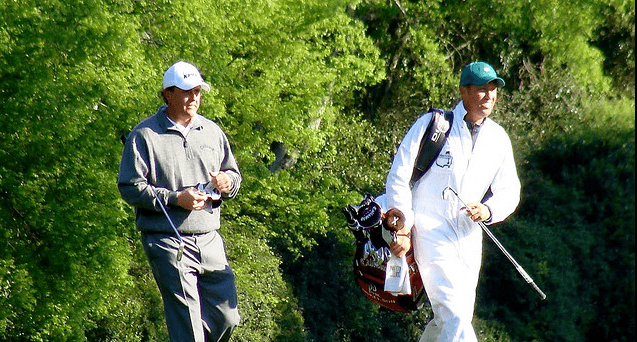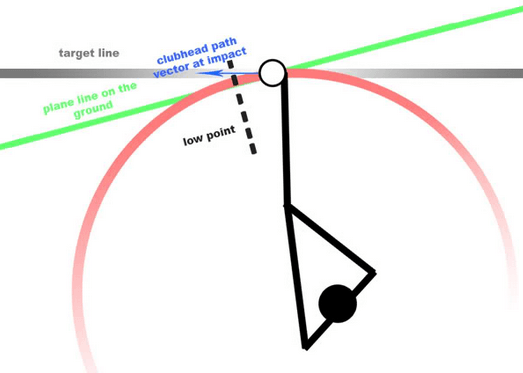Mental Game Mistake 1: Focusing too much on score
In an ideal world, you wouldn’t know what you’re score was during a round until after the last putt was rolled in on the 18th green. I’m sure you’d agree with me on that. Most golfers would play much better if they had no memory of what their score was, or if they didn’t try to predict what score they will have at the end of the round. You would just be play every shot as best you can, a.k.a “one shot at a time”.
Not focusing on score becomes harder the more important the round is. However, with good mental coaching it’s possible to learn how to become less score-focused, so you can more consistently play to your full potential.
The most common mental mistake that golfers make
The most common mental mistake that golfers make is not being able to detach themselves from their score. Most golfers are adding up their score along the way and judging how good their game is based upon these numbers. If they’re scoring higher than usual, it means (in their head) that they aren’t playing well, and if they are scoring better than usual, their game is on the up…but then, of course, it becomes a case of “if I can continue playing this well, I’m going to shoot a great score!” And then the pressure of “shooting a great score” gets to them and they fall back to their normal level.
Why focus on score at all?
So why focus on score at all? Of course we need a measure of where our games are, what we need to improve and where we are in relation to where we want to go. In this sense, score is a good thing to think about – we need to be honest with ourselves and figure out what we need to do to get better.
But on the course, it’s an exercise in staying present. Simply put, the more present you can stay the better. Unless there’s a real need to know your score for strategy purposes (like having a 3 shot lead coming down the last hole of a tournament), thinking about score is NOT going to help you. Why should how you played the last hole have any impact on how well you play the next? We need to stop being so obsessed with the outcome, and give the shot in front of us 100% of our mental energy. One Shot At A Time. Our minds are at they their quietest and most focused when they are focusing on the present moment. Thoughts about the past and (especially) the future while on the course, will result in performance anxiety (tension, increased heart rate, loss of focus etc) and higher scores.
How do we reduce focus on score?
The number one goal for my students is to execute their process as best they can, and stay in the present in between shots. I’ve got many techniques for a good process and how to stay present in my Ultimate Mental Game Training System. Score plays to the ego, but measuring your success by how well you are sticking to your process and your plan, is playing mastery golf. Mastery golf always produces better scores than ego golf.
Mental Game Mistake 2: Being reactive to bad shots

Photo by Julie Campbell
How you talk to yourself on the golf course can make a big difference in how you perform. Most caddies are selected, not only because they can calculate yardages and read greens, but because they know what to say to a player and when to say it. You can bet your life if Phil Mickelson hit a shot O.B., and his caddy was to say “What the @#$% was that? How can you hit a shot like that you loser!”, he would be fired on the spot. However, this type of negative self-talk is something I hear all the time at my course from players berating themselves after a bad shots and (not surprisingly) I see their performance go downhill.
Most of us don’t have the luxury of a caddie, so we have to create our own “inner caddy”, to praise and celebrate our good shots and bounce back quickly from shots we’re not happy with. To do this, start to develop a list of phrases that you can say after a shot. Challenge yourself to remain emotionally “neutral” to bad shots. Again, as part of my post-round review process I have my students evaluate how well they did this and give themselves a score which we try to beat each time.
Mental Game Mistake 3: Over-analyzing your swing

After a few bad shots, most golfers tend to think their swing is broken, which is simply not the case. They start to focus more and more on their swings, and lose connection with the target and the intention for the shot. The fact is, trying to consciously control your body during any action makes the task more difficult. Trusting what you have is far more important than trying to correct something or forcing a movement while swinging.
Think about if you drove your car while consciously thinking about what your body is doing (“foot on brake, now accelerator…”) and you’d probably get into a crash! Instead you simply trust your ability as a driver. You use your conscious mind to determine where you are going and how to get there (the equivalent of picking targets and strategy) and you use your subconscious mind to actually drive the car. Thinking about your swing while swinging creates tension which interferes with the free-flow of a good swing. It’s fine to think about it on the driving range when you’re practicing a new movement you’ve learnt in your golf lessons (during block practice), but on the course your mind has to be quiet, and your connection with the intention needs to be strong. You can still hit good shots with a less than perfect swing – if you connect to the target and the shot, and trust yourself.
If you need somewhere to put your conscious thought during your swing, from my experience, tempo swing thoughts are best. You could imagine some music in your mind or say the words, “one-two” for the back-swing and “three” for the follow-through. This should help eliminate the swing thoughts and maintain a smooth tempo.
Mental Game Mistake 4: Not picking precise targets
 Photo by Shannon McGee
Photo by Shannon McGee
When you get to overhear caddies and players discuss a shot on the TV, you’ll undoubtedly hear them mention very specific targets. But many amateurs just aim at a general area of the fairway or green and this costs them several shots per round.
Ask any of the top players and they’ll tell you that they make their target as small as possible. Jason Day says: “Aim small, miss small”. In the photo above, Phil Mickelson’s target might be that thin silver tree branch behind the green. It definitely won’t be the whole green or even one half of it. Next time you’re out there, make this a part of your pre-shot routine and you will notice the difference.
Mental Mistake 5: Not making your routine your goal
The shot routine (which includes the pre-shot and post shot routine), is an absolute must if you want to play your best golf. Firstly you need to establish what helps you hit the best shots you can, (every shot routine is different), and then we need to be held accountable for doing it.
It ensures:
1. You focus on the things that will give you the best chance of hitting a good shot
2. You’re not focusing on negatives or what you don’t want to happen
My mental game scorecard (available in my training system) is a great way to shift your focus from outcome (score) to process, and hold yourself accountable. All my students give me a “mental score” at the end of their rounds, which tells me how many shots they stayed in their process.
If you need help putting together a good routine, check out my Ultimate Mental Game Training Program 2017 edition.
Make sure you’re not making any of these mental game mistakes and I’m confident you’ll see improvement in your scores.
Photo by Jim Epler
